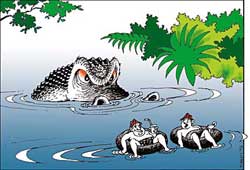 There are times these days when the sense of d?j? vu is so acute it gets unbearable. The appearance on state television news of Prime Minister Surya Bahadur Thapa at the airport on Tuesday flanked by pre-1990 faces to warn protesters on the streets that he would tolerate all criticism except condemnation of the monarchy was straight out of another era.
There are times these days when the sense of d?j? vu is so acute it gets unbearable. The appearance on state television news of Prime Minister Surya Bahadur Thapa at the airport on Tuesday flanked by pre-1990 faces to warn protesters on the streets that he would tolerate all criticism except condemnation of the monarchy was straight out of another era. It is when once self-evident truths have to be restated and enforced by policemen dressed like ninjas that you know the polity has entered another age. The more things change in Nepal, the more they remain the same.
To be fair to the prime minister, this erstwhile warrior against 'underground extra-constitutional forces' during the Panchayat period is still a bulwark against the rise of the hardline right. Having been consistently centrist throughout his career, he apparently sees familiar ghosts from 20 years ago lurking again in the corridors of power.
The day after returning from his second SAARC tour, Thapa reversed the potentially disastrous decision to put three student union leaders behind bars. That short-sighted move had carried all the hallmarks of a bygone era, and was proof to many of the ascendance of Panchayat-era throwbacks in Kathmandu. We get vertigo just watching them struggle to grab the steering wheel as the bus with all of us in it careens to the edge.
There are now too many signs of democratic reversal for this trend to be a fluke: the belief that nominating a new prime minister is some kind of a solution, the announcement of yet another royal civic reception in Nepalganj next month, a familiar sycophantic ambience in the air.
There is a reckless disregard for public will and national sentiment. When you see power as a zero sum game, there is a 50-50 chance you will lose. To win at all cost, it is tempting then, to use militarisation, religious fundamentalism, or revert to authoritarianism. But it is no victory if you haven't addressed the grievances that set all this off in the first place: we don't want this to escalate from a class war to an ethnic or separatist conflagration.
It is already too late to set some things right. But future Nepalis will never forgive us if we don't try, even at this late hour, to work towards a Nepal where power is devolved to the periphery-the only guarantee of lasting peace.
Time is unrelenting, it moves on. Time heals, time manages itself, it takes care of things. We in Nepal have always let time take its course. It is the fatalistic excuse of the feckless to let things drift. Let us, in this new year, take time by its horns. Let us lift ourselves from this quicksand, from a gathering miasma of apathy and hopelessness, to restore faith in our own ability to set things right.


